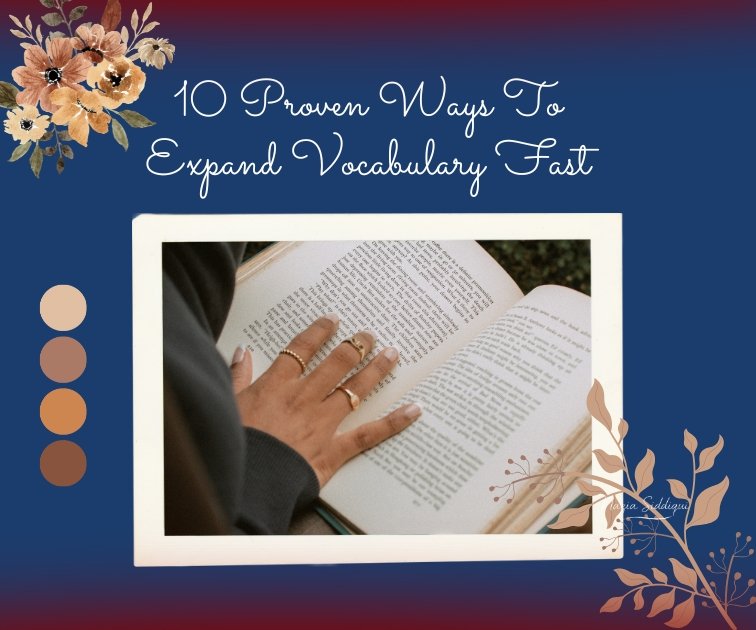Small shifts. Big impact. Begin your journey today.
10 Ways To Learn New Vocabulary Fast And Effectively
Do you remember the first time you struggled to say something in English but just couldn’t find the right word? Maybe you wanted to sound confident in class, during a meeting, or while chatting with friends, but your mind went blank. I’ve been there too—and it can feel frustrating, even discouraging.
But here’s the truth: your ability to learn new vocabulary can completely transform how you communicate, connect, and even how people perceive you. Vocabulary is the bridge between your thoughts and the outside world. Without it, you feel stuck. With it, you feel powerful.
Think of words as tools. The more tools you have, the more you can build, repair, and create. The same goes for language. The good news? You don’t have to memorize endless boring lists. You can learn new vocabulary fast and effectively by using strategies that are fun, practical, and proven.
In this guide, I’ll share 10 ways to learn new vocabulary—methods that have helped not just me, but countless learners worldwide. And yes, we’ll talk about real-life examples, little tricks, and even mistakes to avoid.

10 Ways To Learn New Vocabulary Fast And Effectively
Below are ten proven methods to expand your word power. These aren’t just tips—they are actionable, realistic, and engaging approaches you can start today.
1. Read With Curiosity, Not Pressure
Reading is hands down the best way to learn new vocabulary in English. But many learners make a mistake: they treat reading like a chore. They underline every unknown word, stop every few sentences, and soon lose all motivation.
Instead, read with curiosity. Pick something you enjoy—maybe it’s a novel, a blog, or even song lyrics. Let yourself flow through the story, only pausing for the words that truly spark your curiosity.
I still remember reading Harry Potter in college. The word bewildered caught my attention because it perfectly described how I felt during exams! I didn’t just memorize it—I connected with it emotionally. Years later, I still use it naturally.
💡 Quick Tip
Highlight new words as you read, but don’t stop. Later, look them up and write them in your own sentences.
2. Use Flashcards—But With Emotion
Flashcards are a classic way to learn new vocabulary, but most people use them incorrectly. They write a word on one side, the meaning on the other, and flip them endlessly until their brain goes numb.
Here’s the secret: attach emotions or images to your flashcards. For example, if the word is serene, draw a little lake with mountains. Or imagine yourself sitting peacefully in your favorite park. This emotional connection makes the word unforgettable.
Real-Life story
A friend of mine used flashcards to prepare for IELTS. Instead of plain notes, she made mini doodles for each word. Not only did she score well, but she also remembered those words months later.
3. Practice The “One Word A Day” Challenge
Have you ever wondered: “How can I learn a new word every day?” The answer is simple—by making it a habit. One word a day might sound small, but over a year, that’s 365 words!
Imagine This
You wake up, pick one word (like gratitude), and challenge yourself to use it at least three times throughout the day. At dinner, you might say, “Today, I feel gratitude for my supportive family.” On social media, you might write, “Gratitude unlocks happiness.” By bedtime, the word is yours.
Consistency beats speed. It’s better to truly know one new word every day than to forget fifty by tomorrow.
4. Surround Yourself With English
Want to know the best way to learn new vocabulary? Immerse yourself in English. Surrounding yourself with the language forces your brain to adapt.
Try These Little Hacks
- Change your phone and social media settings to English.
- Watch your favorite shows or YouTube channels in English (with subtitles at first, then without).
- Listen to English songs and note down catchy phrases.
A student of mine once told me she learned the word awkward from a sitcom. Why? Because the funny situation made the word memorable. That’s the magic of context and immersion.
5. Use The “Context Method”
Memorizing words in isolation rarely works. But when you learn new vocabulary in context, they stick like glue.
For example, don’t just memorize benevolent. Instead, read: “The benevolent teacher stayed late to help her students.” Now you know not only what it means but also how to use it.
Think about it—if someone gave you a list of random tools, you’d forget them quickly. But if you saw a hammer used to build a chair, you’d never forget it. Learn new vocabulary work the same way.
6. Keep A Personal Vocabulary Journal
I can’t emphasize this enough: keep your own vocabulary journal. Write down new words, their meanings, and a personal sentence. The act of writing itself strengthens memory.

Here’s A Simple 2-Column Format
| Word | Meaning/Example |
| Resilient | Able to recover quickly: “She was resilient after failure.” |
| Euphoric | Intense happiness: “He felt euphoric after winning.” |
One of my students used a small diary she carried everywhere. Whenever she learned a new word, she scribbled it down. Over months, that tiny notebook became her personal dictionary.
7. Speak And Write Daily
How to learn new vocabulary effectively? Simple: use it. Reading and writing help, but speaking and writing make it real.
- Write short daily journal entries with new words.
- Use new words in casual conversations, even if you feel shy.
- Join online communities where you can practice writing in English.
Here’s what worked for me: I once challenged myself to use one new word in a WhatsApp message daily. My friends found it funny, but soon, those words became part of my natural speech.
8. Learn Through Synonyms And Antonyms
Instead of learning single words, learn in groups. For example:
- Happy → joyful → delighted → ecstatic
- Sad → gloomy → downcast → melancholic
This not only helps you learn new vocabulary faster but also shows you the shades of meaning. After all, happy and ecstatic don’t feel the same, do they?
9. Play Word Games And Quizzes
Learning can (and should) be fun! Games like Scrabble, crossword puzzles, or apps like WordUp, Quizlet, and Duolingo make vocabulary learning exciting.
I once played Scrabble with a friend and learned the word zeal. Because it helped me win, I never forgot it! Motivation + fun = success.
10. Teach Someone Else
If you can teach it, you know it. Share your new words with a sibling, a friend, or even on social media. Teaching forces your brain to organize information clearly, which strengthens memory.
I used to explain new English words to my younger cousin. He thought I was teaching him, but in reality, I was reinforcing my own learning. Win-win!
Frequently Asked Questions
Q1. How to learn new vocabulary effectively?
Mix reading, writing, speaking, and listening. Learn in context, not isolation. Revisit words weekly to make them stick.
Q2. How can I learn a new vocabulary every day?
Pick one daily word, write it down, and use it in at least three sentences. By the end of the year, you’ll know hundreds of words.
Q3. What is the best way to learn new vocabulary?
The best way is immersion—surround yourself with English, read books, watch movies, listen to podcasts, and keep a personal journal.
Q4. How to learn new vocabulary and remember them?
Link words with images, emotions, or stories. The more you relate a word to your own experiences, the easier it is to remember.
Q5. How to learn vocabulary in a new language?
Start with everyday words, use flashcards, practice with natives, and gradually expand.
Q6. How can I learn new vocabulary words quickly?
Combine methods: context learning, daily practice, games, and speaking. Consistency matters more than speed.
Q7. I want to learn new words in English. Where should I start?
Start with daily conversations. Focus on words you can use immediately, then grow from there.
Q8. How to remember new vocabulary words permanently?
Repetition plus usage is key. Write them, speak them, and test yourself often.
Final Thoughts
Words are powerful. They help you share ideas, connect with people, and shape your future. Whether you’re aiming for academic success, career growth, or simply self-expression, learning vocabulary is your secret weapon.
But remember: the goal isn’t to memorize hundreds of words overnight. It’s about building steadily, word by word, day by day. Picture yourself one year from now—reading with ease, speaking with confidence, and writing with elegance—all because you decided to learn new vocabulary today.
👉 So here’s your challenge: pick one new word right now. Write it down. Use it in a sentence. Share it with a friend. Start small, stay consistent, and watch your vocabulary grow beyond what you thought possible.
Your journey starts now—with a single word.
✍️ Written with passion by Nazia Siddiqui – helping you learn, grow, and shine every day.


